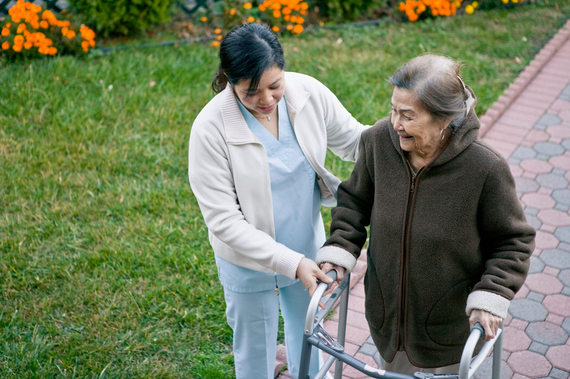
Self-care can be a tricky subject. Some people believe that self-care means not caring for others when it is in fact the exact opposite. It is because we care for others that we must care for ourselves too. We need to "secure the oxygen mask first" because if we don't, we'll need care and not be able to give it.
While "those who care for others professionally" encompasses a variety of fields, I've noticed that oftentimes the ones who put themselves last are those who work in health care, such as nurses, aides, techs, home health workers, social workers and the like. These caregivers tend to take on extra shifts at a moment's notice, skip meal breaks and sometimes can't remember the last time they took a restroom break.
Burnout rates are astounding. Furthermore, according to the National Survey on Drug Use and Health, health care workers, nursing home workers and social workers are among the top 10 professions with high depression rates. A recent study in the American Journal of Preventative Medicine also reported that social workers, counselors, and home health aides have a high obesity rate. These folks often work long hours and help very vulnerable populations with a great deal of needs, often with little resources to offer. No wonder they are prone to illness and depression.
When you are someone who naturally nurtures others, or who has chosen caring for others as a career, you usually give all you have 100 percent of the time. Unless you make a conscious effort, you rarely leave anything behind for yourself and, in the long term, it can sometimes hurt your own health and relationships.
Caring for others involves both emotional and physical care, yet we sometimes think we've taken care of ourselves simply by attempting to get a good night's sleep. It's not enough. We cannot thrive until we've taken care of all our basic physiological needs (which, according to Maslow's Hierarchy of Needs, are food, water, air, warmth and sleep). If we are not thriving, we have nothing left that we can spare for others, either physically or emotionally. It's like trying to drive your car when the fuel tank is empty.
Self-care needs to be part of your daily routine, and here are five (often well-needed) reminders of how you can do that:
1. Stay hydrated. Ensure your body is fueled with the source it needs the most and that is water. Carry a water bottle with you so that even if you don't have time for a break you can ensure your body stays hydrated.
2. Sleep. Aim for 7 hours per night so that your performance isn't impaired the next day. Ensure the room is as dark as possible -- ideally you will not be able to see your hand in the dark. This allows your body to move into the optimum space for allowing sleep. The ripple effect that comes from not getting quality sleep can be detrimental.
3. Eat. Plan ahead as much as possible and bring food with you so you're not tempted to just grab junk food on the run. Ultimately however, just eat something. Your body is not designed to work at high output all day without nourishment.
4. Wind down. Find something that allows you to shut your mind and body down at the end of the day. Turn off the TV, have a candlelit bath, listen to a meditation track or even indulge in some coloring. Each of these allows your mind to slow down and the stress to dissipate.
5. Say no. It is essential to learn the art of saying no. Whether it is no to an extra shift, no to added tasks that push you beyond your limits or no to a demanding patient, you have to put limits in place to ensure you don't suffer for someone else's care.
If you have read these points and you're saying "I know all that," perhaps you could be thinking about how well you are applying them. A night's sleep or a good meal now and then isn't enough; it needs to be consistent for your daily energy and to prevent your own chronic health conditions. If you're feeling worn out, it may be time to change your habits.
Remember, the more care you take of yourself, the better care you can take of others. It's not selfish and it isn't taking anything away from others. On the contrary; it allows you to give the best care you possibly can, without suffering for it.
What are some commitments you can make to yourself, starting right now?
[image credit: stocksy.com]
